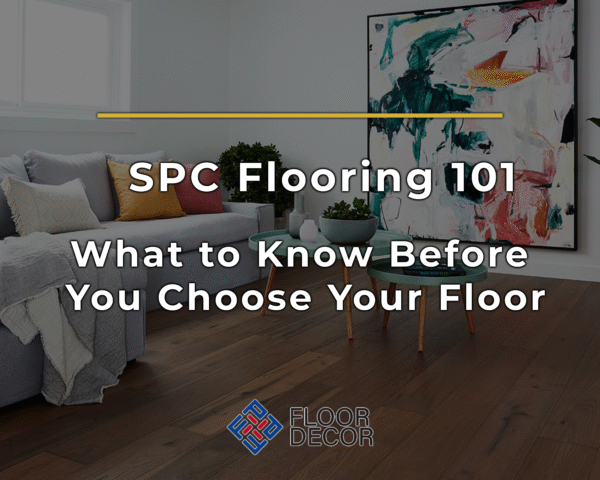When it comes to choosing between laminate and hybrid flooring, there are key differences that can impact your decision. Both are cost-effective alternatives to wooden flooring, offering a range of options from various brands. This blog by experts at Floor Decor will explain the major differences between the two, helping you choose the best option for your home.
Laminate Flooring vs. Hybrid Flooring
Composition
- Laminate Flooring: Made from compressed wood in multiple layers, laminate flooring typically includes a photographic layer that mimics the look of wood.
- Hybrid SPC Flooring: Quality hybrid SPC (Stone Polymer Composite) flooring features a rigid core made from a mix of limestone and stabilizers, topped with a polymer composite layer and often a cork backing for added comfort and sound insulation.
Water Resistance
- Laminate Flooring: One of the major weaknesses of laminate flooring is its susceptibility to moisture. Exposure to water can cause it to warp and swell, making it unsuitable for areas like kitchens and bathrooms.
- Hybrid SPC Flooring: Hybrid SPC flooring excels in water resistance. Its waterproof core makes it an ideal choice for areas prone to moisture, such as kitchens, bathrooms, and basements, providing peace of mind against potential spills and humidity.
Durability and Lifespan
- Laminate Flooring: While laminate flooring is relatively durable, it can show scratches and dents over time, especially in high-traffic areas. Its lifespan typically ranges from 10 to 15 years.
- Hybrid SPC Flooring: Quality hybrid SPC flooring is highly durable, with a rigid composite core that resists scratches and dents. This makes it suitable for high-traffic areas and homes with pets or children. Moreover, the lifespan of hybrid SPC flooring is more than double that of laminate, often lasting 20 to 30 years or more, providing excellent long-term value.
Ease of Installation
- Laminate Flooring: Laminate flooring is known for its easy installation, thanks to the click-lock system. It’s a popular choice for DIY enthusiasts.
- Hybrid SPC Flooring: Hybrid SPC flooring also features a click-lock installation system, but variations may exist between brands. Nonetheless, it is still relatively easy to install and can often be done as a DIY project or by professionals.
Overall Cost
- Laminate Flooring: Generally more budget-friendly, laminate flooring is a cost-effective option for low-moisture areas.
- Hybrid SPC Flooring: While initially more expensive, quality hybrid SPC flooring offers great value due to its waterproof core, superior durability, and extended lifespan, making it a worthwhile investment for areas exposed to moisture and high traffic.
Conclusion
Laminate flooring is perfect for low-moisture regions and budget-conscious installations. Quality hybrid SPC flooring, with its superior water resistance, durability, and long lifespan, represents excellent value for high-moisture areas and high-traffic spots. Flooring decisions should be based on specific needs and budgets, ideally with expert guidance. Reach out to Floor Decor for expert consultation and solutions in flooring services in Auckland.
FAQs About Laminate and Hybrid SPC Flooring
Q1: What is hybrid SPC flooring made of?
Quality hybrid SPC flooring features a rigid core made from a mix of limestone and stabilizers, topped with a polymer composite layer and often a cork backing for added comfort and sound insulation.
Q2: Can laminate flooring be used in bathrooms or kitchens?
Laminate flooring is not recommended for bathrooms or kitchens due to its susceptibility to moisture, which can cause warping and swelling.
Q3: Why is hybrid SPC flooring more suitable for high-moisture areas?
Hybrid SPC flooring has a waterproof core that resists moisture, making it ideal for areas prone to spills and humidity, such as kitchens, bathrooms, and basements.
Q4: Is hybrid SPC flooring more durable than laminate flooring?
Yes, quality hybrid SPC flooring is generally more durable than laminate flooring due to its rigid composite core, which resists scratches and dents, making it suitable for high-traffic areas and homes with pets or children.
Q5: What is the lifespan of hybrid SPC flooring compared to laminate flooring?
Hybrid SPC flooring typically has a lifespan of 20 to 30 years or more, which is more than double the lifespan of laminate flooring, which usually lasts 10 to 15 years.
Q6: Can I install hybrid SPC flooring myself?
Yes, hybrid SPC flooring typically features a click-lock installation system that is relatively easy to install, making it a suitable option for DIY projects or professional installation.





